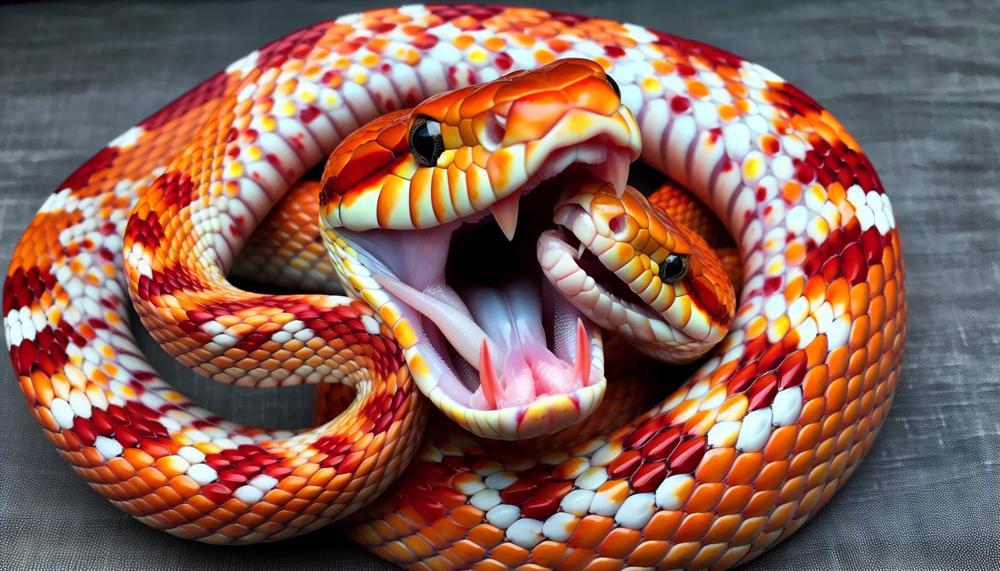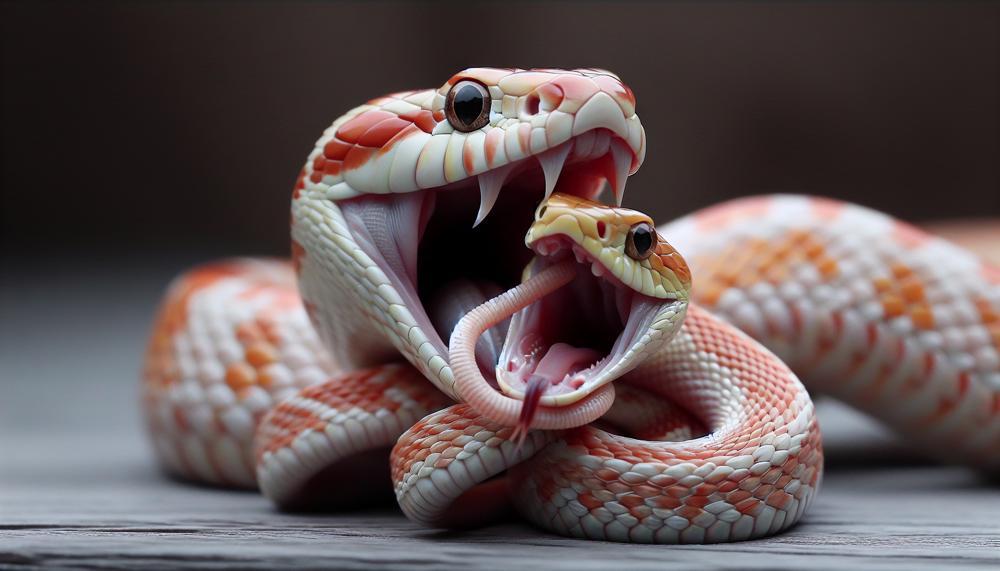Are you fascinated by snakes? Or perhaps you’re simply intrigued by these slithering creatures? Either way, you’ve landed in the right spot. Today, we’re delving into the world of corn snakes and their biting tendencies.
These beloved pet snakes are known for being gentle and easy to handle, but is that always the case? Let’s uncover the truth as we delve into the intriguing topic of corn snake bites.
But before we embark on this journey, here are a few important points to keep in mind:
- Corn snakes are non-venomous and generally safe to handle.
- However, like any animal, they may bite when feeling threatened or stressed.
- Corn snake bites are usually not severe and rarely require medical attention.
- Proper handling techniques can help prevent bites and build trust with your snake.
Now that we have our basics covered, let’s dive deeper into the biting behavior of corn snakes. Get ready to expand your knowledge and gain a deeper understanding of these mesmerizing creatures.
Contents
What To Do if Your Corn Snake Bites You
In the rare and unlikely event that a corn snake bites you, it’s crucial to handle the situation calmly and properly to avoid any unnecessary stress or injuries.
If you find yourself in this situation, follow these steps:
| Step 1: | Remain Calm |
| Stay calm and try not to panic. Remember, corn snake bites are not harmful and do not cause much pain. | |
| Step 2: | Remove the Snake |
| Gently remove the snake from your hand without pulling or causing more stress. You can do this by slowly unwrapping the snake’s body from your hand. | |
| Step 3: | Cleanse the Wound |
| Thoroughly clean the bite wound with soap and warm water to prevent infection. | |
| Step 4: | Apply First Aid |
| If the bite has broken the skin, apply an antiseptic ointment and cover it with a bandage. Keep an eye on the wound and seek medical attention if it shows signs of infection. | |
| Step 5: | Observe for Symptoms |
| Monitor yourself for any symptoms such as redness, swelling, or severe pain around the bite area. Seek medical attention if these symptoms persist or worsen. |
It’s also important to note that prevention is key in avoiding corn snake bites. By properly handling and creating a comfortable environment for your snake, you can significantly reduce the chances of being bitten.
If you have any concerns about your snake’s behavior or health, it’s always best to seek guidance from a veterinarian or experienced reptile owner.
Everything You Need to Know About Corn Snake Teeth
Corn snakes possess sharp teeth that aid them in capturing and gripping their prey. These teeth are situated towards the rear of their mouth and are consistently replenished throughout their lifespan. However, they seldom bite humans unless provoked.
These unique teeth are a crucial aspect of the corn snake’s survival, providing them with the ability to hunt and feed on their prey effectively. Unlike other animals, corn snakes have the advantage of constantly having new teeth to replace any that become damaged or worn out. This adaptation allows them to maintain strong and efficient biting abilities, essential for their survival in the wild.
Interestingly, the teeth of corn snakes are not only used for hunting but also for defense. When threatened or feeling fearful, they may use their sharp teeth as a form of protection. This can be seen in situations where humans try to handle or touch them, causing them to react defensively by biting.
Despite this, corn snakes rarely exhibit aggressive behavior towards humans. They are typically docile creatures and will only bite if provoked or feel threatened. Therefore, it is essential to handle them gently and with caution to avoid any potential bites.
Treating a Pet Corn Snake Bite
Treating a pet corn snake bite can be a frightening experience, but it is crucial to stay calm and take necessary steps to treat the bite promptly. Here are the steps you should follow when treating a pet corn snake bite:
- Stay calm: Although it is natural to feel scared or anxious after being bitten by a snake, it is essential to remain calm. Panicking can elevate your heart rate and spread the venom throughout your body more quickly.
- Carefully lift the snake’s head: If the snake is still attached to your skin, gently lift its head using a blunt object such as a credit card or pencil. Do not attempt to pull the snake off as it may cause further harm.
- Cleanse the affected area: Once you have removed the snake, thoroughly rinse the affected area with warm water and soap to remove any bacteria or venom that may be present.
- Apply an antiseptic ointment: After cleaning the area, apply an antiseptic ointment to prevent infection.
- Monitor for signs of infection: Keep a close watch on the bite for any signs of infection, such as redness, swelling, or discharge. If you notice these symptoms, seek medical attention immediately.
- Avoid handling your snake: It is crucial to refrain from handling your snake for a while after being bitten. This will allow both you and your pet to recover from the incident.
- Consider seeking professional advice: If you are unsure about how to properly treat the bite or if you are experiencing severe symptoms, consider consulting a veterinarian for professional advice.
In more severe cases, antibiotics may be prescribed, or stitches may be needed. Pouring high percentage alcohol over the bitten area can also help remove the snake’s grip and reduce the risk of infection.

It is also worth noting that while corn snakes are non-venomous and their bites are not life-threatening, it is always best to err on the side of caution and seek medical attention if necessary.
| Step | Action | Additional Tips |
| 1 | Stay calm | Avoid panicking to prevent the spread of venom |
| 2 | Carefully lift the snake’s head | Use a blunt object and refrain from pulling the snake off |
| 3 | Cleanse the affected area | Use warm water and soap to eliminate any bacteria or venom |
| 4 | Apply an antiseptic ointment | To prevent infection |
Treating a Pet Corn Snake Bite
Corn snakes are known for their gentle nature, but like any animal, they may bite if they feel threatened or stressed. If you or your pet has been bitten by a corn snake, it’s important to stay calm and take proper steps for treatment. Here’s what you should do:
- Stay calm and handle the situation carefully.
- Wash the bite with soap and water.
- Apply an antiseptic cream or ointment to prevent infection.
- Cover the wound with a bandage or gauze.
- Monitor the bite for any signs of infection, such as redness, swelling, or increased pain.
- Seek medical attention if necessary.
Now let’s dive into more detail on how to treat a pet corn snake bite.
| Step 1: Remain Calm and Handle Carefully | Step 2: Wash the Bite with Soap and Water | Step 3: Apply Antiseptic Cream/Ointment |
| Corn snakes typically have a calm demeanor and will only bite if they feel threatened or stressed. | The first step in treating a corn snake bite is to thoroughly wash the affected area with soap and water. | To prevent infection, apply an antiseptic cream or ointment to the bite site. |
| Step 4: Cover the Wound | Step 5: Monitor for Signs of Infection | Step 6: Seek Medical Attention if Necessary |
| After cleaning the wound, cover it with a bandage or gauze to protect it from further injury. | Keep an eye on the bite for any signs of infection, such as redness, swelling, or increased pain. If these symptoms persist after 48 hours, seek medical attention. | If the bite is severe or shows signs of infection, it’s important to seek medical attention for proper treatment. |
Also Read: Are Corn Snakes Constrictors?
Conclusion
In conclusion, while corn snakes are known for their gentle nature and ease of handling, they may resort to biting when feeling threatened or stressed. However, their bites are typically not severe and rarely require medical attention.
It is important to remain calm and use proper handling techniques to prevent bites and build trust with your snake. These creatures have sharp teeth that serve as both a hunting tool and a means of defense in the wild.
Therefore, it is natural for them to use their teeth when feeling threatened.
In the rare occurrence of being bitten by a pet corn snake, it is crucial to stay composed and properly treat the bite. This includes cleansing the wound, applying an antiseptic ointment, and closely monitoring for signs of infection.
Seeking professional advice from a veterinarian is recommended if the bite appears severe or shows signs of infection.
Remember, early treatment is key in preventing serious complications from a corn snake bite. By understanding their behavior and providing proper care, we can continue to appreciate these mesmerizing creatures as beloved pets.






